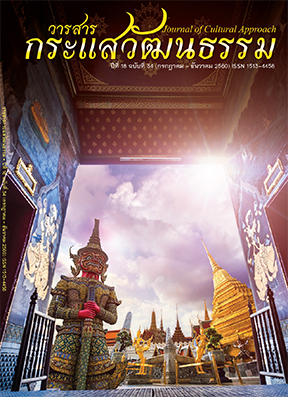การสร้างความเข้มแข็งของทุนมนุษย์ในการจัดการการท่องเที่ยวโดยชุมชนของ ชาวอีสานล้านนาเพื่อส่งเสริมการท่องเที่ยวอย่างยั่งยืน
Main Article Content
บทคัดย่อ
การสร้างความเข้มแข็งของทุนมนุษย์ในการจัดการการท่องเที่ยวโดยชุมชนของชาวอีสานล้านนานี้ มีวัตถุประสงค์เพื่อ 1) เพื่อศึกษาศักยภาพทุนมนุษย์ด้านการท่องเที่ยวของชาวอีสานล้านนา 2) เพื่อพัฒนาศักยภาพทุนมนุษย์ด้านการท่องเที่ยวของชาวอีสานล้านนาเพื่อส่งเสริมการท่องเที่ยวอย่างยั่งยืน การศึกษานี้เป็นงานวิจัยเชิงคุณภาพ ขอบเขตการวิจัยในครั้งนี้มุ่งเน้นศึกษาชุมชนชาวอีสานล้านนา อำเภอเชียงแสน จังหวัดเชียงราย โดยศึกษาจากเอกสาร บทความวิชาการและการเก็บรวบรวมข้อมูลจากภาคสนาม จากกลุ่มตัวอย่างที่ประกอบด้วยกลุ่มผู้นำชุมชน ผู้ประกอบการที่พักโฮมสเตย์ ผู้ประกอบการร้านอาหาร ผู้ประกอบการสินค้าทางการเกษตร ปราชญ์ชาวบ้าน และผู้อาวุโสท้องถิ่น รวมทั้งสิ้นจำนวน 19 คน เครื่องมือที่ใช้ในการเก็บรวบรวมข้อมูล ได้แก่ การสัมภาษณ์เชิงลึก (In–Depth Interview) การสนทนากลุ่มย่อย (Small Group Discussion) และการสนทนากลุ่มแบบเจาะจง (Focus Group) โดยใช้แบบสัมภาษณ์แบบมีโครงสร้างและแบบกึ่งโครงสร้าง แบบบันทึกการสนทนากลุ่ม การสังเกตอย่างมีส่วนร่วม และใช้การวิเคราะห์ข้อมูลเชิงเนื้อหา ผลการศึกษาพบว่า การสร้างความเข้มแข็งของทุนมนุษย์ในการจัดการท่องเที่ยวโดยชุมชนชาวอีสานล้านนา ได้แก่ 1) การแบ่งปันข้อมูล 2) การกระจายรายได้และผลประโยชน์อย่างเป็นธรรม 3) การทำให้ชุมชนรู้สึกเป็นเจ้าของทรัพยากรและเข้ามามีส่วนร่วมในการพัฒนา 4) การส่งเสริมให้ระบบการจัดการเพื่อให้เกิดกระบวนการเรียนรู้ระหว่างชาวบ้านกับผู้มาเยือนโดยใช้กิจกรรมการท่องเที่ยว 5) การสร้างเครือข่ายระหว่างชุมชน
Article Details
Proposed Creative Commons Copyright Notices
1. Proposed Policy for Journals That Offer Open Access
Authors who publish with this journal agree to the following terms:
- Authors retain copyright and grant the journal right of first publication with the work simultaneously licensed under a Creative Commons Attribution License that allows others to share the work with an acknowledgement of the work's authorship and initial publication in this journal.
- Authors are able to enter into separate, additional contractual arrangements for the non-exclusive distribution of the journal's published version of the work (e.g., post it to an institutional repository or publish it in a book), with an acknowledgement of its initial publication in this journal.
- Authors are permitted and encouraged to post their work online (e.g., in institutional repositories or on their website) prior to and during the submission process, as it can lead to productive exchanges, as well as earlier and greater citation of published work (See The Effect of Open Access).
Proposed Policy for Journals That Offer Delayed Open Access
Authors who publish with this journal agree to the following terms:
- Authors retain copyright and grant the journal right of first publication, with the work [SPECIFY PERIOD OF TIME] after publication simultaneously licensed under a Creative Commons Attribution License that allows others to share the work with an acknowledgement of the work's authorship and initial publication in this journal.
- Authors are able to enter into separate, additional contractual arrangements for the non-exclusive distribution of the journal's published version of the work (e.g., post it to an institutional repository or publish it in a book), with an acknowledgement of its initial publication in this journal.
- Authors are permitted and encouraged to post their work online (e.g., in institutional repositories or on their website) prior to and during the submission process, as it can lead to productive exchanges, as well as earlier and greater citation of published work (See The Effect of Open Access).
เอกสารอ้างอิง
[2] Baum, T. (2007). Progress in Tourism Management Human Resources in Tourism: Still Waiting for Change. Tourism Management, 28, 1383-1399.
[3] Cohen, J. M. & Uphoff, N. T. (1980). Participation’s Place in Rural Development: Seeking Clarity through Specificity. World Developments, 8, 213-235.
[4] Corbin, J., & Strauss. (2008). Basic of Qualitative Research. London, England: Sage
[5] Creswell, J.W. (2009). Research design: Qualitative, Quantitative and Mixed Methods Approaches. 3rd ed. Los Angeles: sage
[6] Erwin, W. (1976). Participation Management: Concept, Theory and Implementation. Atlanta.
[7] Gatewongsa, Krittayawadee., Buapaun, Nakarn., & Pethjul, Siwawong. (2012). Community Strengthening Among the Changes by a Grounded Theory Study: A Case Study of the Farmer Community School. Lampang Rajabhat University Journal, 1(1), 12-24.
[8] Goodwin, H. & Santilli, R. (2009). Community-Based Tourism: A Success?. ICRT Occasional Paper 11, 1-37.
[9] Kasai, Praweena., & Phansita, Nalinee. (2016). The Needs of Training and Development and Career Planning of Dusit Thani College’s Instructors. Journal of Dusit Thani College, 10(2), 77-92.
[10] Kornpetpanee, Suchada., Suksawang, Poonpong., Varakantsiri, Wanlada., Seesai, Supparak., & Thiamtham Thuttarit. (2007). Community Participation in Managing the Impact of Firefly Tourism in Khlong Amphawa, Samut Songkhram Province. Journal of Education Research and Measurement Burapha University, 5(2), 118-135.
[11] Kusluvan, S., Kusluvan, Z., Ilhan, I., & Buyruk, L. (2010). The Human Dimension A Review of Human Resources Management Issues in the Tourism and Hospitality Industry. Cornell Hospitality Quarterly, 51(2), 171-214.
[12] Nelson, Nici & Wright, Susan. (1995). Power and Participatory Development: Theory and Practice. ITDG Publishing. ISBN 978-1853392412
[13] Okazaki, E. (2008). A Community-Based Tourism Model: Its Conception and Use. Journal of Sustainable Tourism, 16(5), 511-529.
[14] Prasongthan, Supapron. (2013). Social Capital Potentiality for Creative Community Based Tourism: The Study of Tai Puan Community, Pak Plee District, Nakron Nayok Province. Journal of Social Sciences, 16(January – December).
[15] Ryan, C. (1995). Research Tourist Satisfiction: Issues, Concepts, Problems. London, England: Routledge.
[16] Scheyvens, R. (2002). Tourism for development: Empowering communities. Pearson Education.
[17] Suansri, Potjana. (2003). Community Based Tourism Handbook. Bangkok: Tourism Project for Life and Nature. (in Thai)
[18] Tawinwadee, Bureekul (2008). Participation: conceptual theoretical framework. King Prajadhipok's Institute. (in Thai)
[19] Wedchayanon, Nisada. (2008). New Dimension in Human Capital Management (Managing Talent). Graduate School of Public Administration, National Institute of Development Administration.
[20] White, Alastair T. (1982). Why Community Participation? A Discussion of the Argument Community Participation: Current Issue and Lesson Learned. United Nations Children's Fund, 1-18.


